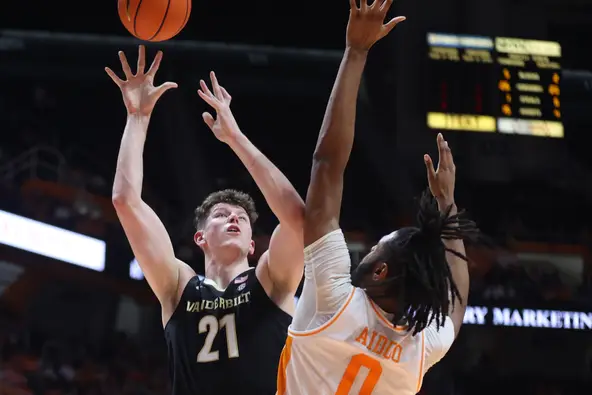After a difficult start to SEC play, the Hogs have to be a bit relieved to finally match up with an opponent located near the bottom of the SEC standings, even if it is on the road. This game marks the start of a long stretch of games that are mostly winnable: it’s not unreasonable to think that the Hogs could go 5-1 in their next six SEC contests heading into that road tilt with Kentucky on February 7th. And who knows, by then, Nick Smith could be back in the lineup and anything would be possible.
Meet the Commodores
Vanderbilt had a long run of fairly sustained success under Kevin Stallings (1999-2016), but his tenure eventually grew stagnant and he bolted for Pitt. Coming anywhere near Stallings’ success has been an issue ever since. Bryce Drew made an NCAA Tournament in his first season, but by Year 3 went 0-18 and was fired.
Now Jerry Stackhouse is just 47-62 in his fourth season, including 14-41 in SEC play. There was clear progress last year, as a team led by Scottie Pippen Jr. led Vandy to the NIT Quarterfinals and a 19-win season, Vandy’s best since 2017. Even though Pippen is gone, there were pretty high expectations for Vanderbilt this season, as several major role players from last year’s team returned, and Stackhouse managed to sign multiple 4-star recruits plus a coveted transfer guard in Ezra Marjon of UC Davis.
Unfortunately, the Commodores have been unable to keep that momentum going on the court.

Vanderbilt hasn’t looked horrible: all of the losses except for Grambling and possibly Southern Miss are certainly not bad losses, and that win over Pitt looks pretty good after the Panthers’ hot start in ACC play. Plus Vanderbilt was very competitive in both road conference losses.
But losses are losses, and Vanderbilt is well outside of any NCAA bubble talk, which makes this game a must-win for Arkansas.

Arkansas still grades as the nation’s 16th-best team with the 25th-best resume, though that momentum number (now 258th) says the Hogs are starting to show evidence of a backslide.
Vanderbilt, on the other hand, is starting to create some positive momentum by playing much better in recent games.
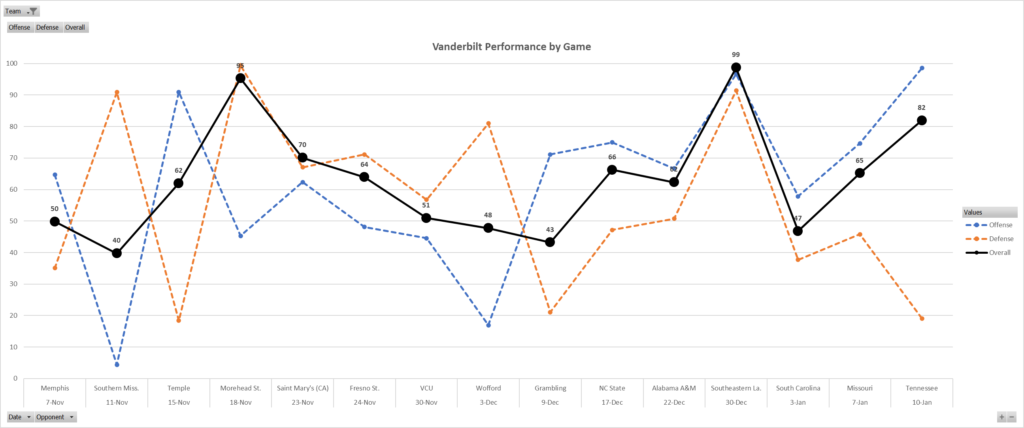
The Dores had a bit of a slide in late November through mid-December but have recovered. They’ve only graded below 60 once since December 9th, and they won that game (South Carolina). As you can see, their offense (blue line) is really driving their improvement.
Model pick: Arkansas 71, Vanderbilt 67.
Scouting Report
Vanderbilt runs a very perimeter-oriented offense. They’ll put four perimeter players around a big 7-footer and try to clear paths to the basket for their guards. They play with a very slow pace and run really good offensive sets, with lots of ball screens both on and away from the ball.
Defensively, they are primarily a man-to-man team, although they are unlikely to match up well with Arkansas in man. They smother the perimeter and their 7-footer is a shot-blocker, but their wings are the weak point of their defense. They force almost no turnovers and can be victimized around the rim in their base defense. Expect to see zone, and probably a lot of it.
Starters
- Liam Robbins, C, 7’0 (+11.7 BPM, 97 RAPM)
- Myles Stute, W, 6’7 (+1.1 BPM, 71 RAPM)
- Jordan Wright*, W, 6’6 (+3.1 BPM, 59 RAPM)
- Tyrin Lawrence, SG, 6’4 (+1.6 BPM, 58 RAPM)
- Ezra Manjon, PG, 6’0 (+0.4 BPM, 69 RAPM)
Vanderbilt has a very imbalanced roster: Robbins has a better BPM than every Arkansas player, but seven Hogs grade better than Wright, Vandy’s next-best.
Robbins has some similarities to Oklahoma’s Tanner Groves, though he’s more talented and more physical. He’ll wander out to the perimeter to set screens and will take around one-fifth of his shots from beyond the arc. He does his best work inside, where he draws a ton of fouls (28% free throw USG) and crashes the offensive boards (12% offensive rebound rate). He’s an excellent shot-blocker, too, swatting about 8% of field goal attempts while he’s on the floor. He leads the team with 28% USG, so he’ll be the focal point of Vanderbilt’s offense.
Outside of Robbins, Vanderbilt gets the rest of their offense from their two wings, while the two guards serve as defensive specialists.
Wright is the other high-volume Dore (25% USG) who often comes off the bench but plays starter minutes. He has some similarities in his game to Ricky Council: a high-usage jumbo guard who is a 3-level scorer. He struggles to get to the free throw line (just 10% free throw USG), which may be an issue for him against the Hog defense. He grades very poorly as a defender.
Stute is the 3-point threat. About three-quarters of his shots will come from beyond the arc and he will do very little inside of it. Defensively, he guards the 4 but struggles. If the Hogs do indeed let Jalen Graham play the 4 like he did against Alabama, this is a very juicy matchup.
In the backcourt, Manjon struggles to get to the free throw line (10% free throw USG) and turns it over a little too often (19% turnover rate), though he does lead the team with an 18% assist rate. He is not a 3-point shooter. His strength is his excellent defense on the perimeter. Lawrence is a decent 3-point shooter on fairly low volume. He can also get to the line a little bit. His issue is turnovers (21% turnover rate). Like Manjon, he’s a good defender on the perimeter.
Bench
- Colin Smith*, W, 6’8 (+2.2 BPM, 71 RAPM)
- Quentin Millora-Brown, PF, 6’10 (+1.0 BPM, 10 RAPM)
- Trey Thomas, PG, 6’0 (+0.0 BPM, 53 RAPM)
Vanderbilt suffers a pretty big dropoff when they have to get into their bench. Smith, who often starts in place of Wright, is a promising freshman who protects the ball, gets to the free throw line, and defends really well. But Millora-Brown has struggled and is a major downgrade when he replaces Robbins. He plays Jaylin Williams defense, so he tries to draw charges, which means he also racks up blocking fouls. And Thomas is a 3-point shooter whose shot does not fall at a high rate.
When Vanderbilt has the ball

Like any team whose best player is a lumbering center, Vanderbilt wants to slow the game down and get things set up for Robbins in halfcourt. They’ll run only when they have a good chance to, and their possessions tend to take awhile.

Their deliberate pace helps them protect the ball and get plenty of shots up. Between a solid turnover rate and a decent offensive rebounding rate, they get plenty of shot chances. I like the Hogs’ odds of boxing them out of rebounds, but Arkansas is struggling to force turnovers right now, and given the need to improve offensively, I’m not if that’s going to change anytime soon.
Vanderbilt struggles to create shots near the rim, even though because of Robbins, they tend to make those at a good rate when they get them. So instead they shoot a lot of 3-pointers, which they do not make at a good rate.
Some credit for Vanderbilt’s strong halfcourt offense has to go to Stackhouse, who designs good sets for his offense. Vanderbilt often gives 5-out looks and aims to get their guards into the paint, using good spacing plus screens both on and away from the ball:
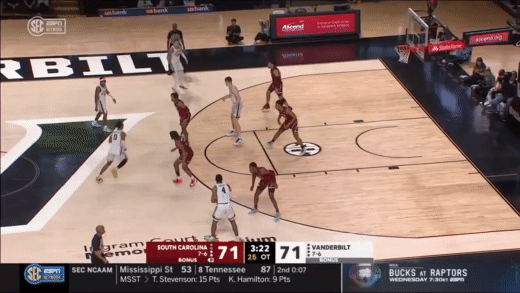
Note Robbins flashing into the lane late on that play. He drew the rim protector out of the lane and flashed back in to act as a rim runner who can clean up the missed shot.
If the low defender tries to help on the ball in the paint, Vandy’s guards are always looking for an easy dump-off to Robbins:
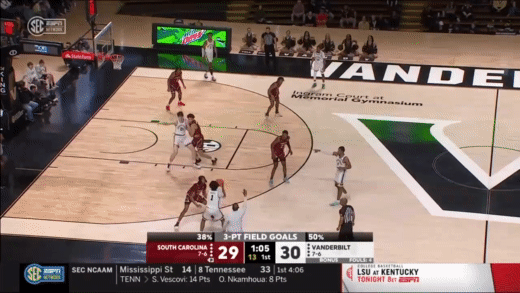
Robbins can also occupy the paint and pull off a more traditional post-up, like here where he draws a foul:
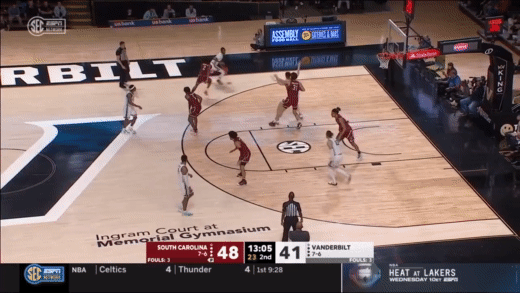
If Arkansas can’t stop those post-ups 1-on-1, there could be trouble. Vandy’s 5-out offense means there’s always a path to the basket, so if you try to help on Robbins, you risk the easy basket:
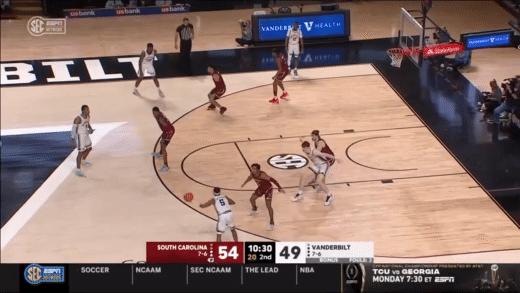
In their perimeter game, Vanderbilt will screen away from the ball for Stute, who is their only really strong 3-point shooter:
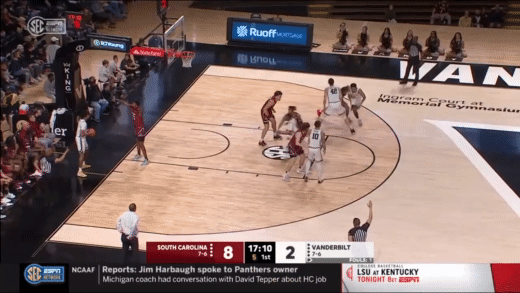
How does Arkansas defend?
If the Hogs can smother the perimeter and have Makhi (or Makhel) Mitchell limit Robbins, then the Hogs should be able to shut the Vanderbilt attack down without too much difficulty. Of course, that’s easier said than done.
One of the Mitchell twins will likely play at all times and defend Robbins. Obviously that’s the first key. I would expect Devo Davis to defend Stute, as he typically takes the opponents’ best 3-point shooter. Bonus points for Devo: after having to defend D’Moi Hodge and Brandon Miller, who are legitimate threats to put it on the deck and take it to the rim, Stute is… not. Vanderbilt will do a little bit more in terms of moving Stute around without the ball, but he’s less versatile with the ball in his hands.
That leaves Arkansas with a Jalen Graham problem. As we discussed after the Alabama game, the Razorback offense desperately needs to be jump-started, and Graham grades as the best offensive player on the team right now. But Graham is too weak as a defender to play the 5 for extended stretches (and certainly against Robbins), so he has to play the 4. But against Vanderbilt’s perimeter-heavy approach, that leaves Graham defending out on the perimeter, and probably against Stute no less. Does Arkansas really want that? That creates enormous risk for the Arkansas perimeter defense, risk that I’m not sure a defensive-minded coach like Eric Musselman is comfortable with. But if the Arkansas offense struggles, he might not have a choice.
When Arkansas has the ball

Vanderbilt’s defense has been good at limiting transition, but they tend to get punished in the halfcourt. Arkansas would like to run but should be able to score in halfcourt as needed.

The Commodores don’t force turnovers at all, which is the main knock against them. As we saw in the player intros, their defenders are not very aggressive. They get virtually no steals, only Robbins is a shot block threat, and they don’t collect a lot of fouls or pressure the ball much.
Obviously a key question: does Vanderbilt go zone and force Arkansas to beat it? My guess is yes. Stackhouse has played zone before at Vanderbilt, even if his teams are primarily man.
Vanderbilt’s base defense is a very poor matchup for Arkansas’ offense. Like most man-to-man teams, Vandy smothers the perimeter but is vulnerable at the rim. That 3-point defense won’t help them much against Arkansas, while ranking outside the top 100 in rim USG and rim FG% is a problem. Additionally, as we saw in the player intros, Vanderbilt’s wings are the weak point of the defense. Those are the guys that will be matched up on Council and, potentially, Graham. Not ideal for Vandy.
So I think you’ll see a lot of zone, which means Arkansas is going to have to attack the boards and get to the free throw line. The lack of Vandy ball pressure should help Anthony Black advance the ball into the teeth of the zone, but Arkansas has to be more active away from the ball. The off-ball movement has mostly been bad this year.
I think Arkansas can create enough shots to win by not turning it over and winning on the offensive glass against the zone. They won’t necessarily need to shoot a great percentage (particularly from beyond the arc) if that’s the case. However, Arkansas has struggled with an elevated turnover rate in conference play. Vanderbilt won’t force them, but the Hogs cannot give them away.
Keys to the Game
- Dominate the defensive glass. This is a key matchup, as Vanderbilt on the offensive boards and Arkansas on the defensive boards are both top 75 nationally. The Hogs can smother the perimeter but if they give up a lot of long rebounds there will be problems.
- Mitchells win versus Robbins. The Mitchell twins will have the tall task of containing Vanderbilt’s 7-footer. He doesn’t have to be totally shut down, but limiting his impact on both ends is a key goal for Makhi and Makhel.
- Find some offense. I’ll leave this one open-ended, because Arkansas still needs a strategy on offense. Maybe Ricky Council, Anthony Black, and Jordan Walsh finally figure it out. Or maybe it’s time to give Jalen Graham or Joseph Pinion more opportunities. If the Hogs look awful on offense again, then it may truly be time to hit the panic button, because there’s nothing to lose trying something new coming into this game.
Thanks for reading! Be sure to follow us on Twitter and on Facebook.
The latest from Fayette Villains, straight to your inbox
Enter your email to subscribe and receive new post alerts and other updates. You can unsubscribe at any time.
